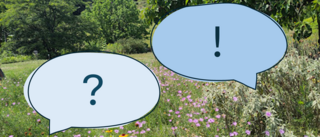Funding
Funding line I
Research funding and start-up financing
"A research fund of EUR 100,000 per year will be set up to initiate further third-party funded research in the context of the guiding principle of sustainable development. These funds will be allocated by the Extended Board of the WueLAB following a transparent application and selection process." (University agreement between Julius-Maximilians-Universität and the Bavarian State Ministry of Science and the Arts dated September 21, 2023, p. 26)
Target group:
All university members, especially academics and researchers
All important information on funding line I (funding amount, application, criteria, deadlines, etc.) can be found in this
Funding line II
Promotion of studentprojects
"JMU will provide financial support for student involvement (including doctoral students) in the field of sustainable development, particularly in the context of student projects and/or transformation experiments at WueLAB from 2024." (University agreement between Julius-Maximilians-Universität and the Bavarian State Ministry of Science and the Arts dated September 21, 2023, p. 27)
Target group:
JMU students and doctoral students from all subject areas
All important information on funding line II (funding amount, application, criteria, deadlines, etc.) can be found in this
Dr. Valentina Glück
Research associate/post-doc, Department of Clinical Psychology and Psychotherapy
Conversations and feelings in ecological crises: Affective and emotional characteristics of everyday climate-related interactions

Picture: Dr. Valentina Glück
The research project is a preliminary work for a larger, planned third-party funding application on communication about climate and environmental crisis-related feelings in personal relationships. In this project, we conceptualise everyday interactions as sites of emotion regulation that can influence how strongly external stresses - such as the current climate and biodiversity crises - affect individual well-being (Barthel et al., 2018; Kałwak & Weihgold, 2022). Conversely, there is evidence that everyday interactions influence individual engagement with environmental issues and the corresponding behaviour (Norgaard, 2006). However, there is still little research in clinical psychology on how we communicate about our climate- and environment-related feelings and what influence these interactions have on our well-being. Our study therefore aims to first open up the research field for us in order to gain access to more concrete research questions. We use qualitative interviews for this purpose. In September and October 2024, we will conduct twenty interviews with people from the city and district of Würzburg as part of the project.
References:
- Barthel, A. L., Hay, A., Doan, S. N., & Hofmann, S. G. (2018). Interpersonal Emotion Regulation: A Review of Social and Developmental Components. Behaviour Change, 35(4), 203–216. https://doi.org/10.1017/bec.2018.19
- Kałwak, W., & Weihgold, V. (2022). The Relationality of Ecological Emotions: An Interdisciplinary Critique of Individual Resilience as Psychology's Response to the Climate Crisis. Frontiers in Psychology, 13, 823620. https://doi.org/10.3389/fpsyg.2022.823620
- Norgaard, K. M. (2006). "People Want to Protect Themselves a Little Bit": Emotions, Denial, and Social Movement Nonparticipation Sociological Inquiry, 76(3), 372–396. https://doi.org/10.1111/j.1475-682X.2006.00160.x






